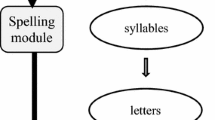Abstract
Substantial neurobiological data indicate that the dominant cortical region for printed-word recognition shifts from a temporo-parietal (dorsal) to an occipito-temporal (ventral) locus with increasing recognition experience. The circuits also have different characteristic speeds of response and word preferences. Previous evidence suggested that grain-size increased with word repetition. In the present experiment, we examined morpheme boundaries imposing a limitation on steadily increasing grain-size within a word. We manipulated the type font within a word so that it either emphasized or disguised the word’s morphemic structure. The results showed that, even after several repetitions, morphemic structure had an effect on word recognition, although eventually it did become nonsignificant. Thus, the spread of grain-size with repetition does not appear to cross morpheme boundaries easily. These results suggest that skilled, experienced, word recognition may achieve its speed, substantially, by unitizing the word’s letters within but not across its morphological units.
Similar content being viewed by others
References
Baayen, R. H., Piepenbrock, R., & van Rijn, H. (1993). The CELEX lexical database [CD-ROM]. Philadelphia, University of Pennsylvania, Linguistic Data Consortium.
Feldman L.B. (1995). Morphological aspects of language processing. Hillsdale, Erlbaum
Helenius P., Salmelin R., Service E., Connolly J.F. (1998). Distinct time courses of word and context comprehension in the left temporal cortex. Brain 21(6): 1133–1142
Katz L., Lee C.H., Tabor W., Frost S.J., Mencl W.E., Sandak R., Rueckl J., Pugh K.R. (2005). Behavioral and neurobiological effects of printed word repetition in lexical decision and naming. Neuropsychologia 43, 2068–2083
McClelland J.L., Rumelhart D.E. (1981). An interactive activation model of context effects in letter perception: I. An account of basis findings. Psychological Review 88(5): 375–407
Pugh K.R., Mencl E., Shaywitz B.A., Shaywitz S.E., Fulbright R.K., Skudlarski P., Constable R.T., Marchione K., Jenner A.R., Shankweiler D.P., Katz L., Fletcher J., Lacadie C., Gore J.C. (2000). The angular gyrus in developmental dyslexia: Task-specific differences in functional connectivity in posterior cortex. Psychological Science 11, 51–56
Pugh K.R., Shaywitz B.A., Shaywitz S.A., Shankweiler D.P., Katz L., Fletcher J.M., Skudlarski P., Fulbright R.K., Constable R.T., Bronen R.A., Lacadie C., Gore J.C. (1997). Predicting reading performance from neuroimaging profiles: The cerebral basis of phonological effects in printed word identification. Journal of Experimental Psychology: Human Perception and Performance 2, 1–20
Rumelhart D.E., McClelland J.L. (1982). An interactive activation model of context effects in letter perception: Part 2 The contextual enhancement effect and some tests and extensions of the model. Psychology Review 96, 60–94
Rumsey J.M., Nace K., Donohue B., Wise D., Maisog J.M., Andreason P. (1997). A positron emission tomographic study of impaired word recognition and phonological processing in dyslexic men. Archives of Neurology 54, 562–573
Salmelin R., Service E., Kiesila P., Uutela K., Salonen O. (1996). Impaired visual word processing in dyslexia revealed with magnetoencephalography. Annals of Neurology 40, 157–162
Seidenberg M.S., Waters G.S., Barnes M.A., Tannenhaus M.K. (1984). When does irregular spelling or pronunciation influence word recognition?. Journal of Verbal Learning & Verbal Behavior 23, 383–404
Shankweiler D., Lundquist E., Katz L., Stuebing K., Fletcher J., Brady S., Fowler A., Dreyer L., Marchione K., Shaywitz S., Shaywitz B. (1999). Comprehension and decoding: Patterns of association in children with reading difficulties. Journal for the Scientific Study of Reading 3, 69–94
Shaywitz B.A, Shaywitz S.E, Blachman B.A., Pugh K.R., Fulbright R.K., Skudlarski P., Mencl W.E., Constable R.T., Holahan J.M., Marchione K.E., Fletcher J.M., Lyon G.R., Gore J.C. (2004). Development of left occipitotemporal systems for skilled reading in children after a phonologically- based intervention. Biol Psychiatry 55(9): 926–933
Stone G.O., Van Orden G.C. (1994). Building a resonance framework for word recognition using design and system principles. Journal of Experimental Psychology: Human Perception and Performance 20, 1248–1268
Ulrich R., Miller J. (1994). Effects of truncation on reaction time analysis. Journal of Experimental Psychology: General 123, 34–80
Ziegler J., Goswami U. (2005). Reading acquisition, developmental dyslexia, and skilled reading across languages: A psycholinguistic grain size theory. Psychological Bulletin 131, 3–29
Author information
Authors and Affiliations
Corresponding author
Rights and permissions
About this article
Cite this article
Lee, C.H. Adaptive Changes in Grain-size in Morphological Processing. J Psycholinguist Res 37, 59–67 (2008). https://doi.org/10.1007/s10936-007-9059-6
Published:
Issue Date:
DOI: https://doi.org/10.1007/s10936-007-9059-6




